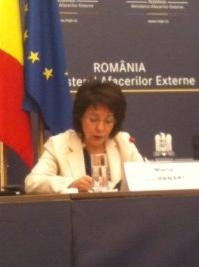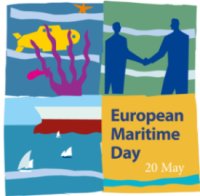Moving forward on the Black Sea maritime agenda

Ministerial Seminar "EU policies at the Black Sea: enhancing regional cooperation"
Bucharest, 29 March 2012
In the framwork of her visit to Romania, Commissioner Maria Damanaki spoke at the Ministerial Seminar "EU policies at the Black Sea: enhancing regional cooperation", in Bucharest.

Dear Minister Diaconescu, Minister Orban, Ladies and Gentlemen,
I would like to start by saying something that is perhaps not commonly known. It is not easy to find a printed map of the Black Sea. There are maps of the Balkans, of Central Asia, but not that much of the Black Sea as such. A symptom, perhaps, of the fact that it is never considered as a single entity, but always as a crossroads, a turning platform, or a meeting point of several cultures.
It is time for us to start adding force to the identity of the Black Sea as a specific region. This is something that will benefit Romania greatly.
The Black Sea is important. Moreover, it has been an EU basin for 5 years now. I think it is time to start thinking in strategic terms about the role it should take up in the region.
Nobody should think that because we have only two countries in the Black Sea which are EU Members, and because their two coasts put together are less than 1% of the European coastline, we consider it less important.
Quite the opposite: I want to help this country and I want to make sure that the EU stands strong next to Romania and to Bulgaria for that matter, in the Black Sea, in terms of integrated maritime policy and fisheries policy.
In fact, I believe maritime and fisheries policies are a good starting point to engine-start regional cooperation and stimulate the Romanian economy. The Black Sea has many strong maritime assets: it is a popular tourist destination; it has a significant volume of traffic – of people, goods, gas and even oil; its environmental status is improving.
Romania and Bulgaria, which for the EU are the two entry points into the basin, have only to gain from mutual maritime cooperation: from conservation of resources to transport corridors, from clean waters to tourism, an integrated approach can only improve people's lives.
But I am here to say that it is also time to extend cooperation to the other Black Sea countries. They too should come into the picture. In the maritime world, we are all interdependent and if one acts alone, the results are rather limited.
In fisheries, if the parties don’t play by the same rules, the playing field can never be even and conservation efforts are bound to fail. Data collection is of little use unless it is exhaustive and accurate. Scientific research is stimulated by international exchange.
When we develop EU-wide control procedures we also build trust among neighbouring fishing nations. The joint training and inspection missions in the context of the so-called "Joint Deployment Plans" allow people to work together and get to know each other. Experience in the North Sea and the Baltic Sea shows that this may take some time -but ultimately contributes to smooth relations among states.
So let us not be stopped in any way by the fact that we share this basin with partner countries. On the contrary, this is the true advantage of regional cooperation: it enables all levels and all countries to work together and on an equal footing.
I am keen on Black Sea cooperation because of the unique opportunities that it can open up. With the inclusive approach that we are aiming at, we may be able to obtain results that years of division and isolation have rendered unlikely to achieve through all the traditional political approaches and means.
It goes without saying that this will not be done overnight. This is a process. We should more forward step by step. My idea of what the first steps should be was confirmed at our meeting on the Black Sea last October in Brussels: we must have a common vision; we must make the Black Sea a clean and secure marine space; we must foster scientific cooperation; we must improve the image of the region, and its image as a tourist destination.
Last October I had insisted that we should include all coastal countries in a serious study on how to improve the status of Black Sea fish stocks. Now, a working group on the Black Sea within the General Commission for Fisheries in the Mediterranean has been created; a first meeting already took place, and I am proud to say that all the basin's countries were represented, including those which are not members of the GFCM. This is an encouraging result.
At that meeting I also asked the European Parliament to organize a meeting with the Black Sea Economic Cooperation Parliamentary Assembly. I look forward to the outcome of that discussion. Whenever possible, we should work hand in hand with this important organization, a reference point for cooperation in the Black Sea.
As a next step, I intend to organise a conference in November 2012 here in Bucharest that will gather interested parties - public and private - from the whole Black Sea basin. You are all invited, and I hope as many of you as possible can take part.
Moreover, the Reform of the EU Common Fisheries Policy that I have proposed will enhance the regional dimension. The European Union will set guidelines, targets and legal framework, but it will be up to the national and regional authorities to take implementation into their hands and adopt custom-made measures that meet the needs of their territory. This can become another piece of this stronger identity that we want to build for this sea basin.
Besides, a well managed fisheries system does not only benefit the fisheries sector, but also leads to spin-offs on land: transport, processing, restaurants and so on.
At this difficult economic juncture, the reform of the Common Fisheries Policy is of direct relevance to your country too, as it helps the economy as a whole.
In the meantime, Romania must improve its use of the EU funds. Five years after accession, the current rate of absorption is very low.
You need to get ready, so that you can derive benefit from the Reform of the Common Fisheries Policy, from the new system of Regional Funding and from the "Blue Growth" initiative.
What is Blue Growth? Well, if we want to make sure that our use of marine resources is sustainable, and that our maritime and coastal economies thrive, we must provide an optimal framework for them to operate in. This is Blue Growth.
We want to invest in maritime Europe. But we want to focus our efforts where it matters most and we want to work with emerging sectors to secure their development.
We are currently determining the best course for this, and I plan to propose a policy initiative on how to harness Blue Growth later this year. Our focus will be on emerging maritime sectors that have the potential to serve Europe’s future needs - such as aquaculture, seabed mining and offshore renewable energy sectors.
And we are trying to organise the functioning of regional funds and regional policy in a way that supports the development and health of coastal communities to the greatest extent possible.
This goes far beyond the small amounts available under the label "Maritime Policy" – we now have the opportunity to look at how we can harness the impressive machinery of EU funding to work in the interest of coastal regions and sea basins.
The new financial framework which is currently under discussion in the Parliament and in Council will allow, for the first time, Member States to determine jointly with others and with EU bodies how to best go about regional development.
This is, I think, where it gets particularly interesting for Romania. Member States surrounding sea basins and their coastal regions have an opportunity here to finally turn into reality what they have long called for: true strategies that aim at the sustainable growth and development of whole regions and sea basins.
They will be able to underpin their work for the economic performance of maritime regions with strategies that build the best possible environment in terms of economic climate, infrastructure and support.
But for that, a strong absorption capacity and an efficient managing authority will be necessary.
Ladies and Gentlemen,
Romania has achieved quite a lot in the last few years and this is the result of hard work. I seize this occasion to thank all the authorities who, at various levels, are engaged in a fruitful and intense cooperation with the EU institutions.
Romania is a relatively new Member of the EU and some adaptation time might be necessary. There is still work to be done. I would like to send a message to Romania, as a friend, to overcome the remaining difficulties with the Funds and the Verification mechanism. I will also ask you to support the Commission in lifting the borders with the Schengen area. And rest assured that we will do our part.
But going back to where we started, there are domains where the EU needs the Romanian input and perspective. One of them is definitely the Black Sea.
Thank you.


 European Maritime Day 2013
European Maritime Day 2013 Reform of the Common Fisheries Policy
Reform of the Common Fisheries Policy 12 hours for Greece
12 hours for Greece